How Age UK helps older people stay fit and healthy
We visit an exercise class in Oxford to find out what makes the class so successful.

Different activities bring a different range of benefits, so try a variety of things. Finding something you enjoy means you’re more likely to do it regularly.
| Activity/exercise | Flexibility | Strength | Stamina | Balance |
| Brisk walking | ü | ü | ü | |
| Climbing stairs | ü | ü | ||
| Swimming | ü | ü | ||
| Dancing | ü | ü | ü | |
| Bowls or golf | ü | ü | ü | |
| Yoga | ü | ü | ü | |
| Tai chi | ü | ü | ü |
You don’t have to be moving around to benefit from exercise. Chair-based exercises, which you can do sitting or holding on to the back of a chair, are ideal for improving muscle strength and flexibility. You can watch videos online that demonstrate chair-based exercises.
If you’re physically able, but find yourself sitting in front of the computer or television for hours at a time, try to break it up and build activity into your day.
Why not go for a short, brisk walk around the garden or in the street after writing an email or finishing another task where you’ve been sitting still.
However, if you have a health condition that makes moving about difficult or painful, such as Parkinson’s, arthritis or osteoporosis, always consult your GP for help in choosing the right exercise for you.
They may be able to suggest suitable activities and may know of special exercises or classes for people with these health conditions.
In some areas, your GP may be able to refer you to a structured exercise scheme, where trained instructors introduce you to exercise over a period of 12–20 weeks.
We visit an exercise class in Oxford to find out what makes the class so successful.
Every year our Advice Service deals with thousands of calls from older people in need. Call us today to make sure that you are receiving all the help and support available to you.